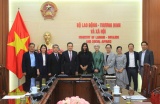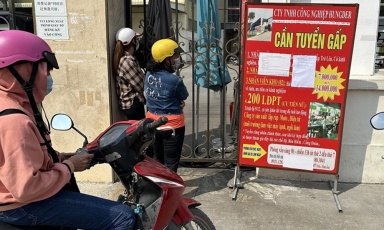Wage inequality has declined in two-thirds of countries worldwide since start of 21st century
(LĐXH)- Global real average wage growth has started to rise again as inflation progressively eases. Despite these positive outcomes, high levels of wage inequality remain, making it a pressing policy issue, ILO report finds.
A new report from the International Labour Organization (ILO) reveals that wage inequality has decreased in about two-thirds of all countries since 2000. Despite this positive trend, significant wage differentials persist worldwide.
Since the early 2000’s, on average, wage inequality, which compares the wages of high and low wage earners, decreased in many countries at an average rate that ranged from 0.5 to 1.7 per cent annually, depending on the measure used. The most significant decreases occurred among low-income countries where the average annual decrease ranged from 3.2 to 9.6 per cent in the past two decades. 


Wage inequality is declining at a slower pace in wealthier countries, shrinking annually between 0.3 and 1.3 per cent in upper-middle-income-countries, and between 0.3 to 0.7 per cent in high-income countries. Moreover, even though wage inequality narrowed overall, decreases were more significant among wage workers at the upper end of the pay scale.
The report also finds that global wages have been growing faster than inflation in recent times. In 2023, global real wages grew by 1.8 per cent with projections reaching 2.7 per cent growth for 2024, the highest increase in more than15 years. Such positive outcomes mark a notable recovery when compared to the negative global wage growth, of -0.9 per cent, observed in 2022, a period when high inflation rates outpaced nominal wage growth.
However, wage growth has been uneven across regions, with emerging economies experiencing stronger growth than advanced economies, the report finds. While advanced G20 economies registered a decline in real wages for two consecutive years (−2.8 per cent in 2022 and −0.5 per cent in 2023), real wage growth remained positive for both years in emerging G20 economies (1.8 per cent in 2022 and 6.0 per cent in 2023).
Regional wage growth patterns varied considerably. Wage workers in Asia and the Pacific, Central and Western Asia, and Eastern Europe experienced their real wage increases at a faster rate than those in other parts of the world, according to the report.
Despite recent progress high levels of wage inequality remain a pressing issue. The report shows that globally, the lowest-paid 10 per cent of workers earn just 0.5 per cent of the global wage bill, while the highest-paid 10 per cent earn nearly 38 per cent of this wage bill. Wage inequality is the highest in low-income countries, with close to 22 per cent of wage workers there classified as low-paid.
Women and wage workers in the informal economy are more likely to be among the lowest paid. This finding reinforces the need for targeted actions to close wage and employment gaps and ensure fair wages for all wage workers.
Wage inequality is relevant in all countries and regions. Globally, however, one in every three workers is a non-wage worker. In most low- and middle-income countries the majority are self-employed workers, who can only find opportunities to earn a living in the informal economy. It is for this reason that the report broadens its analysis to include the self-employed in the case of low- and middle- income countries. As a result, measured labour income inequality increases significantly in these regions, as compared to that measured based only on wages from wage workers.
The study emphasizes the need for targeted policies to foster inclusive economic growth.
The report concludes that reducing wage inequality requires both strong wage policies and structural support for equitable growth. By addressing these challenges countries can make real progress toward reducing wage gaps and promoting fair, sustainable, economic growth for workers worldwide./.
Minh Ha
TAG:
Wage inequality












